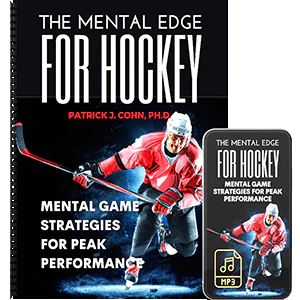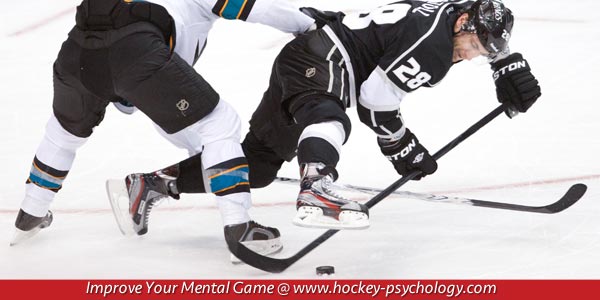The “Play to Win” Mindset to Close Out Games
Are you able to close out games when you have the lead?
When you head into the final period of a hockey game, do you maintain the same style of play that secured you the lead, or do you revert to playing defensively?
Going for the knockout blow when in the lead is a mindset and hallmark of championship hockey teams and players. Championship teams finish games with the same attacking style that they imposed at the start of the game.
Hockey players that play defensively at the end of a game fear losing. The fear of failure increases anxiety and causes players to play make mistakes.
Players that “play not to lose,” play tight and back on their heels. They are in reaction mode and allow the other team to dictate the style of play. In most cases, teams and players that “play not to lose” or try to hold on to a lead allow opposing teams back into the game and, often times, fail to secure victory.
The Tampa Bay Lightning has just three wins in the past 13 games (3-8-2) and has lost their last five games.
With 17 games remaining in the regular season, the Lightning is clinging on to a wild-card spot. Prior to the Olympic break, Tampa Bay was in second place in the Atlantic Division only seven points behind Boston. Currently, Tampa Bay is in fourth place in the Atlantic and 16 points behind the division-leading Bruins.
Tampa Bay’s Performance Skid is NOT Due to Slow Starts
The Lightning had the lead or was tied heading into the third period in six out of the last seven games. Tampa Bay’s issue is their negative mindset and inability to finish off their opponents, managing to earn only four points in the last seven games.
Prior to the Olympic break, the Lightning was 22-3-1 when scoring the first goal. Tampa Bay is 1-3-2 since the break.
Tampa Bay loses their focus late in games and has been plagued by mistakes, bad passes in the defensive zone, poor defensive-zone coverage, goaltending lapses and blown coverage.
Center Valtteri Filppula feels the Lightning changes their mindset and style of play in the final period of play in an attempt to not lose, “I feel like we are trying, and maybe some parts we are trying too hard. When we are up one (goal) and they get a goal, I don’t want to say we panic, but we kind of lose our game even though we should play the same way.’’
Lightning center Tyler Johnson suggested Tampa Bay needs to maintain their competitive mindset in order to successfully close out games, “You just have to stay mentally sharp, play your game, and you can’t really change your game when you have the lead.
You have to do the things that got you that lead in the first place. I think we kind of got away from that a little bit, just some unlucky things here and there (and) some mental errors that normally would never happen.’’
Having the “Play to Win” Mindset
- What’s the strategy that helps you play aggressively and get into the lead. Use your strengths that got you into the lead. Stay aggressive and challenge yourself to make another play or score. Increase your lead instead of protecting it.
- Focus on one play at a time or the current play. Being in the moment allows you to focus on executing the only play that’s important—the current one. When you are “playing not to lose,” you are focused on the score and the outcome of the game.
Improve your mental toughness with one-on-one mental coaching with Dr. Cohn.
Related Articles on Hockey Mental Game:
- How to Close Out a Game When Leading
- Using Your Mind to Close Out Hockey Games
- Does Your Hockey Team Play Not to Lose?
*Subscribe to The Sports Psychology Podcast on iTunes
*Subscribe to The Sports Psychology Podcast on Spotify
The Mental Edge for Hockey

The Mental Edge for Hockey teaches you proven and simple mental game strategies so you can overcome fear of failure, lack of confidence, slumps or poor composure, take your practice game to competition, and boost your confidence in hockey. You learn simple, actionable mental game strategies to help you perform at your peak!
I’ve worked with athletes for 30 plus years – and know the top challenges that undermine performance when you perform in games. Now you can tap into my expertise and experience in coaching hockey players on the mental game.
In this program, you’ll learn the TOP 10 mental training lessons for hockey players – the same strategies I teach one-on-one athletes I coach on the mental game. My clients pay thousands of dollars for personal coaching, but now you can have the same strategies to improve your mental game – at a fraction of the price.

Leave a Reply